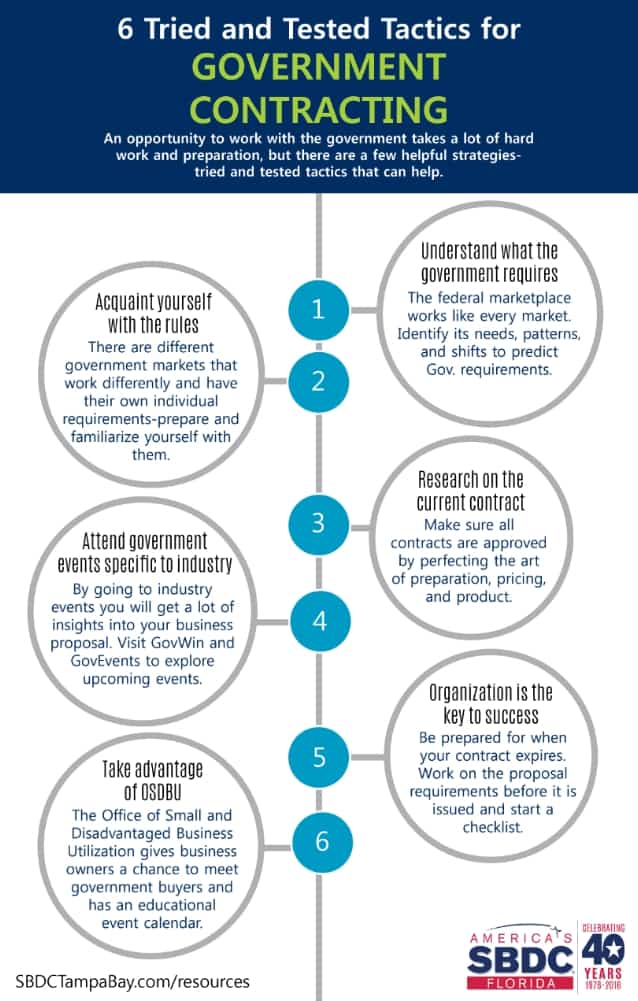6 Tried and Tested Tactics for Government Contracting
Even though there are budget cuts in the federal government it is still one of the most lucrative places to get contracts from – especially for small businesses. You can take an assumption from the fact that they spend nearly $500 billion every year on these contracts and by law 23 percent of this is supposed to go the small businesses every year.
But here’s the thing – you are thinking about working with the largest goods and services purchaser in the country and it won’t be that easy. One of the biggest challenges in government contracting is access. Gaining entry and getting that first contract can seem extremely difficult. An opportunity to work with the government takes a lot of hard work and preparation, but there are a few helpful strategies – tried and tested tactics that can help.
- Understand what the government requires – One of the first things that you will have to learn is it always about the demand in the market. The federal marketplace works like every market. If you can identify its needs, follow its patterns and trends, monitor the shifts in the market, and then predict what the requirements of the government is going to be, then you will have an edge on your competition.
- Acquaint yourself with the rules – It is important to understand that there are different government markets and these different agencies work differently and have their own individual requirements. The government sector is quite different from the private sector and therefore before you leap, you have to look. There are stricter bidding proposals and the requirements are longer. So prepare and familiarize yourself with that.
- Research on the current contract – Each year the small businesses have a large share of the contracts to get but not all of them will make the mark. So what went wrong with the ones that get rejected? If you are interested in a bidding particular project do your homework. Find out what why the contract is being sourced. Did the contract expire? Did the current contractor fail to perform? Was the pricing model lucrative? If you can prefect the art of preparation, pricing, and product you will be all set for landing the contract.
- Attend government events specific to industry – Make it a point to attend government events that are specific to your industry. You will get a lot of insights into your business proposal. In fact it might actually cut your job out for you. You can visit GovWin and GovEvents to explore the events that are upcoming.
- Organization is the key to success – Once you have completed your research on the current contract. Be prepared for when it expires. You want to start working on the proposal requirements before it is issued. Start a checklist, will it require you to ramp up your cash flow, increase manpower, raise your insurance caps and premiums. Start a checklist and be prepared to expand your capabilities and capacities.
- Take advantage of OSDBU – The Office of Small and Disadvantaged Business Utilization is something you will have to keep an eye on. It publicizes opportunities for the business owner to meet the government buyers. They also have an event calendar to educational events that will give you tips on how to do business with the government contract.






Yolanda Goodloe
Consultants, Cowart, Government Contracting Consultants, PinellasFlorida PTAC at Pinellas County Economic Development
Specialty: Procurement
Yolanda Goodloe has more than 20 years of experience in public service at the local and municipal levels. Early in her career, she worked as a human resources and relations professional while serving as a liaison to the business community and advocacy groups. Her prior experience includes being a human relations specialist for Lee County Government, and an equal opportunity director for the City of Fort Lauderdale. Her background combines public service and human relations experience with hands on leadership in equal opportunity, supplier diversity, business certifications programs, organizational training and development, and managing workforce diversity principles. Goodloe is the procurement specialist for the Florida PTAC at Pinellas County Economic Development. She connects businesses to resources and tools for state, local, and federal contracting opportunities. She is a Certified Procurement Professional (CPP), a Supply Chain Management Professional (SCMP), and a Certified Verification Counselor. She graduated from Florida State University with a bachelor of arts in political science and history.